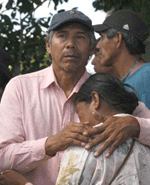Argentina: Indigenous Community “La Primavera” elected representative
Published on Mon, 2011-07-04 10:35
Source: CELS On June 25, members of the Toba-Qom indigenous community “La Primavera” of Formosa held an unprecedented event: the election of its representative before the national government and provincial authorities. The Centre for Legal and Social Studies (Centro de Estudios Legales y Sociales, CELS), focal point of Social Watch, participated as supervisor in this process, which resulted in the election of Félix Díaz. Over 80 per cent of the 1,256 members of the community that were registered in the electoral roll voted in this transparent process, without any sort of irregularities. Díaz obtained 610 votes followed by Cristiano Sanabria with 369 and will have to take steps and carry out negotiations aimed at the restitution and retention of lands belonging to the community. This week, the newly elected representative of “La Primavera” enrolled in the National Register of Indigenous Communities (RENACI). The election was organized by a dialogue committee made up of representatives of the province and federal government, the Ombudsman’s Office, the State Prosecutor’s Office and civil society organizations. The director of the Economic, Social and Cultural Rights programme of CELS, Diego Morales, participated as observer in the Election Board and assured that “it was a quiet election, without any sort of pressure, since both groups had agreed on the electoral roll”. According to Morales, this election was a key step so that “the Qom may discuss and find a solution to the basic problem over the traditional lands that belong to them”. In April, the Inter-American Commission on Human Rights (IACHR) had requested the Argentine State “to adopt the measures necessary to safeguard the lives and physical integrity” of the members of the Toba-Qom community of “La Primavera”. In a resolution, the IACHR backed the safety measures that had been requested by the community, under the sponsorship of the State Prosecutor’s Office and CELS. According to the Commission, the Argentine State should protect these indigenous people “against possible threats, aggression or harassment by members of the police, public authorities or other State agents”. Since Díaz had been forced to leave the province owing to threats against him and his family, the IACHR also urged the State to guarantee his the safe return. Safety measures were requested after the displacement and repression suffered by community members in November 2010. As a result of that operation, two people died, dozens were seriously wounded, and children, pregnant women and old people were detained. Furthermore, members of the community had their houses burned down, thus losing their personal belongings and documents. |


